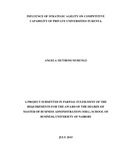| dc.description.abstract | In today’s fast changing and increasingly global business environment, hardly any
company is safe from competition anymore. Nowadays, almost all companies operate in
uncertain and dynamic competitive environments. The companies must nevertheless be
able to compete in sustainable ways. In the early 1990s, the concept of agile
manufacturing was devised to address those considerations. The private universities in
Kenya face the challenges of fluctuating demand and stiff competition from public
universities and also an upsurge in the number of private universities in the country.
Strategic agility is the ability to continuously and adequately adjust and adapt in
appropriate time the strategic direction in core business in relation to changing
circumstances. Building strategic agility in firms is a way to manage unforeseen changes
and risks faced by firms. This study adopted a cross-sectional research design based on
the key areas of interest. The target population for this study was 24 private universities
in Kenya. The study adopted a census approach collecting data from the administrators of
all the private universities in Kenya. The researcher used a questionnaire as the primary
data collection instrument to collect data on the effect of strategic agility on competitive
capability of private universities in Kenya. The questions were designed to collect
qualitative and quantitative data. Descriptive statistics was employed. The quantitative
data was coded to enable the responses to be grouped into various categories. The
organised data was interpreted in terms of averages and standard deviation to objectives
using a computer packages SPSS (version 21) to analyze the research findings. The
researcher found that private universities adopt change disposition as a strategic agility
practise to a very great extent. The researcher also found out that change disposition
influences competitive capability to a great extent. The study findings reveal that
knowledge of appropriateness of change effort motivates employees to put their full
effort in managing. The research also makes the conclusion that virtual integration
competence enhances the ability of a firm and its value chain members to pursue new
product initiatives. The research further concludes that fluid partnering allows for quick
delivery of products in the market. The research concludes that various strategic agility
variables have an influence on competitive capability of private universities. | en_US |

